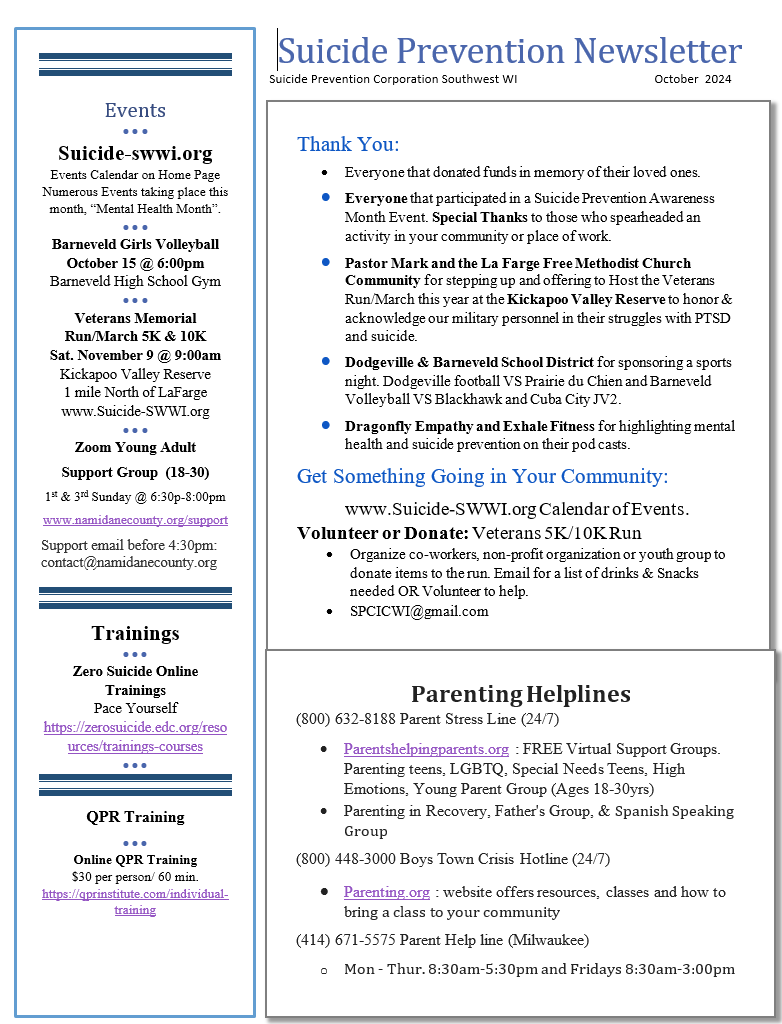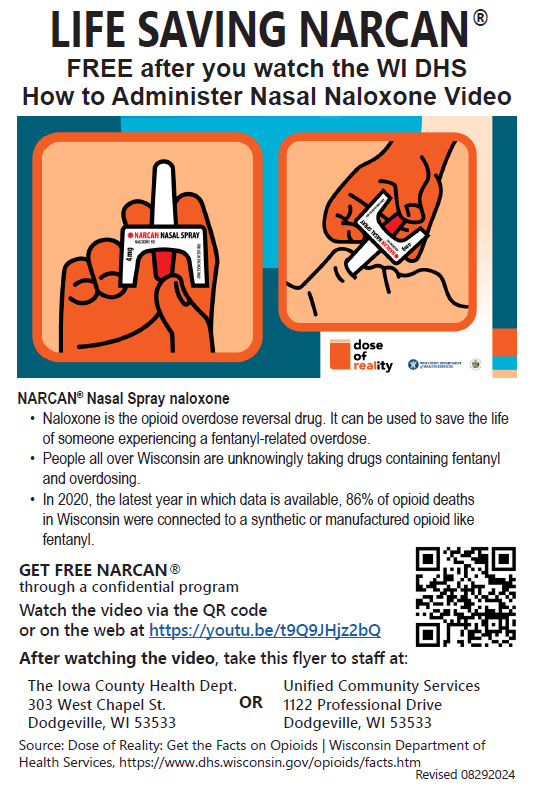





Grant County 2024 Outings- all free unless noted (Some Iowa/Lafayette)
Grant County Events- https://grantcounty.org/events/
Iowa County Events- https://healthyiowacounty.org/community-events-calendar/
Boscobel- https://boscobelwisconsin.com/calendar/
-Saturdays- May to October-Farmers market- 8-12
-10/5- Boscobel Trunk or Treat, 8am-5pm
-12/7- Christmas in Boscobel, 8am-5pm
Cassville- https://www.explorecassville.com/events-calendar
-Wednesday Nights- 445-7pm- Movie Nights- Eckstein Memorial Library
-First Thursday of the Month- 1130am-1230- Tiny Tales- Eckstein Memorial Library
-3rd Mondy of the Month- Lego Funday- 330-430- Eckstein Memorial Library
-Saturdays 9/14 and 9/28- 8-12. Volunteer Park.
-9/26-9/28- Community Wide Fall Garage Sales
-10/19- Safe and Spooky Halloween
-10/31- Halloween Parade
-11/30- Christmas in Cassville
Cuba City- https://www.facebook.com/events/explore/cuba-city-wisconsin/108239512531201/?ref=110
-10/20- Fall Festival at Cuba City Elementary- trunk or treat, games, food drucks, etc. Costumes encouraged. $5 donation requested. 11am-1pm.
-9/18- Fall Night market, 430-830, downtwon on West Ann Street.
-12/7- Holiday Festivities/parade and Santa
Dickeyville- https://www.dickeyville.com/calendar
Dodgeville- www.dodgeville.com and https://healthyiowacounty.org/community-events-calendar/
-Farmer’s Market- 5/11-10/12- 8-1130am- Saturdays- Methodist Church Parking lot at 327 N. Iowa Street.
-Wednesdays- yoga- 9-930- 115 W. Merrimac Street. No cost. Bring your own mat.
-Saturdays- yoga- 9-10- 115 W. Merrimac Street. Donations appreciated. Bring your own mat.
-11/30- Home for the holidays
Fennimore- https://fennimore.com/events/list/
-9/26-9/28- Fall Citywide Garage Sales
9/29- Heritage Day
10/27-Trunk or Treat- 2-4pm
-11/30- christmas Creations craft fair and marker’s Market, 9am-2pm
Hazel Green- https://www.facebook.com/events/explore/hazel-green-wisconsin/108065089221076/
-Every Wednesday, 1030-1130- Havel Green Public Library- coffee, converstation and coloring for adults, bring your own mug, if you are able.
-Fall Festival, Annual Hog roast, and annual Christmas craft fair- unable to find more information on them
Lancaster- https://www.lancasterwichamber.com/events.html#/
-10/5- harvest festival and parade- 11am
-11/2- Holiday Craft Sale
-12/6- Frosty Night of Cheer
-12/14- Santa at the courthouse, 9-11am
Livingston-
Monfort-
Muscoda- https://www.facebook.com/profile.php?id=100069294336435&ref=settings
Platteville- https://www.platteville.org/calendar and https://platteville.librarycalendar.com/events/month
-Saturdays- May to October- 8-12 Platteville Farmers Market, City Park. Winter Market- November to april- 1 and 3rd Saturday of the month, 9-12 Rountree Gallery
-9/29-1-4pm, Taste of Platteville- food ($1 food tickets each), live music, 1-4pm pickleball tournament 10am-3pm
-10/12-Homecoming Parade- Main Street- 10am
-10/12-Family Fun and Raffles Event- 9-11am, Smith Park
-10/25-10/26- Katie’s Holloween Garden- Katie’s garden- 5pm
-10-26-Sweet treats on main- 11am
-12-6-12-7- Katie’s Garden Winter Wonderland, 5pm-10pm
Potosi-Tennyson- https://www.potosiwisconsin.com/local-events
-Driftless Gate Market- September 7, 21.
-9/18-5-7pm- Grant Regional Celebration- open to public, kids bounce house, firetruck tours, free vision screening or blood pressure screening, BBQ available for purchase.
-9/22-Masonic Lodge Annual Car Show, 8am-3pm, Holiday Gardens, Potosi
-9/28- Night Market- Hickory Hill Park, 330-9pm
-10/12- Masonic Lodge Annual Fish Fry- cost
-11/9-9am-3pm- Holiday craft and vendor fair, Holiday gardens
-11/27- Trivia and Chicken Dinner- cost
Other Considerations
-Disc Golf
-Bike Paths
-Fishing, Hiking, Walking
-Geocaching
-Golf-cost
-Pickleball
-Canoe, kayak- rentals available- Wisconsin River Outings in Boscobel, Y’Allbee Tubin, Wyalusing State Park- cost
-Tubing down Grant River, shuttle services available, Grant river Tubin’ Co. in Potosi- cost
-Swimming pools- Casseville, Fennimore, lancaster, montfort, Wyalusing Public Beach, Woodman Recreation Area – cost
-Coffee Shops-cost
-Bowling- cost- sign kids up for free bowling at kidsbowlfree.com
-Movie theaters- cost
-Roller Skating- Fennimore Rainbo palace Roller Skating Rink
-Ice cream- cost- Grab a Cone in Monfort
-Rural one Popcorn- cost- Monfort
-Exercise options online: Fiton app (free, workouts, variety of exercising like yoga, weights, pilates, mindfulness, HITT, etc). Online exercise classes and meditation: https://thephoenix.org/





Super grateful to have community partners like Grant County Social Services and their CST Team who created the Back to School Resource Fair for Grant County residents on August 26, 2024. We were honored to partner with them to help families get their needs met at the beginning of the school year with so many other other vendors and stakeholders who work so hard to meet the needs of Grant County families.
Article at https://www.wpr.org/…/summer-back-to-school-supply…
Thank you also to Wisconsin Public Radio for covering these efforts in their recent article!

